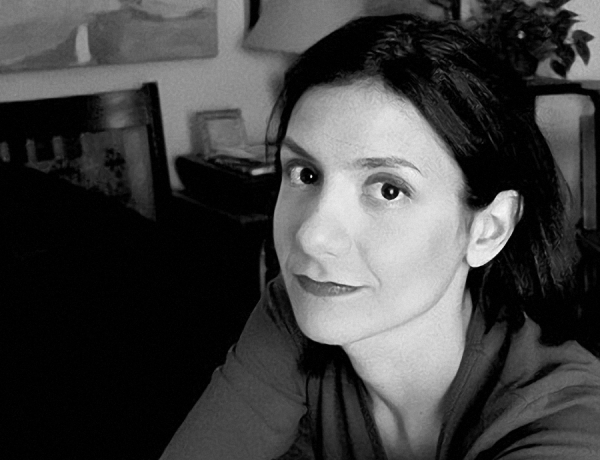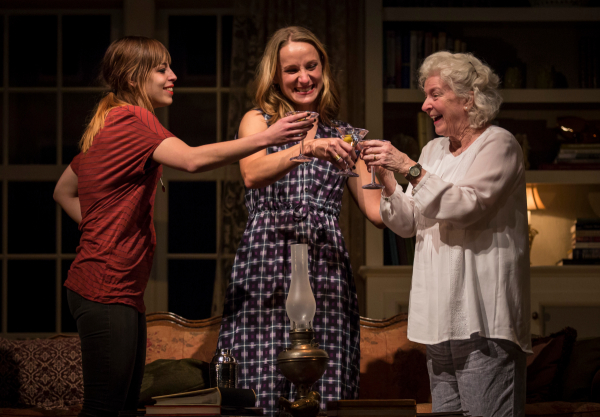Playwright Gina Gionfriddo on the "Rapturous" Journey of Rapture, Blister, Burn
The female-centric play, now running at Chicago’s Goodman Theatre, has spent the past few years cultivating a global audience.
Since its 2012 off-Broadway debut with Playwrights Horizons, Gina Gionfriddo's Rapture, Blisture, Burn and the three generations of women it gives voice to have taken their timeless debate on the road.
San Francisco, Los Angeles, Salt Lake City, London, and Boston are just a handful of cities in which the play's questions have taken root. Career or family? Which takes precedence? Which path will be paved with the most regret? A successful academic, Catherine, and her friend Gwen, who has gone the domestic route, become representatives of this two-sided coin, with Catherine's traditional mother Alice and a "progressive" college student named Avery flanking them on either side of the spectrum of feminist philosophies.
Several years and a Pulitzer Prize nomination later, TheaterMania caught up with Gionfriddo, who now objectively reflects on the play's surprisingly far-reaching journey (its latest stop is Chicago's Goodman Theatre, where it is being directed by Kimberly Senior of Broadway's Disgraced). Gionfriddo, a single mother of a three-year-old daughter herself, is seeing the next generation of women join the conversation she began in 2012. And the new questions they bring to the table are as complex as ever.

How does it feel seeing Rapture, Blister, Burn so warmly received by so many different theaters, not just around the country but around the world?
Honestly, it feels good. This one's been a very pleasant surprise because when I wrote it, I thought that it was going to be a play with a very narrow appeal — that women would like it, that bookish people would like it. But my agent told me the other day he thinks in the end it will have more regional productions than Becky Shaw.
Since its off-Broadway debut, how involved have you been with the play's regional productions?.
The first regional production had the same company so I tagged along for that one but not too much with the others. I never really get comfortable watching my stuff. I'm always squirming, so I'm sort of relieved when I'm not involved with it. Sometimes the director will seek me out to talk and sometimes they won't. I was more open to going and seeing productions when I didn't have a child but I'm a single mom of a three-year-old so I haven't been going to see that much.
Did the Goodman director Kimberly Senior seek you out for advice?
Yeah. Kimberly was in New York a lot because she was doing Disgraced on Broadway, so we were able to [meet for] breakfast or coffee. She really want[ed] to ask me questions.
What are the most common questions directors ask you about the play?
Kimberly didn't ask this, but I get a lot of, How are we supposed to feel about these characters? I hear a lot that I write unlikeable characters or characters that are hard to like. So there are questions about How do you want the audience to feel about this person? That's actually my biggest anxiety about the work being done. I have great affection for everybody I put onstage. I would hate to think there's a production going on where Don is a terrible villain. I don't see him that way.
Why do you think audiences have latched onto this play so strongly?
I think there's something very appealing about plays where different generations have a dialogue with each other. It sparks a discussion in families.
Have people of different generations had distinctly different responses to the play?
I've mostly talked to people in their twenties and thirties who tell me that they brought older people in to see it. The surprise has been that I've done some interviews along the way with women in their twenties or early thirties and I could sense them having an interest in what my prescription would be. They were having questions themselves about When do you stop to have a family? How long do you push career? I was surprised that anyone would look to me for an answer because I don't have one.
You've written about the connection between Rapture, Blistern, Burn and The Heidi Chronicles and the impact Wendy Wasserstein's play had on you when you first saw it as a college student. Are you excited to see the play come back to Broadway?
I am. I'm excited to see it again as an adult and to see what my feelings are. I think the [production's promotional materials] are trying to address the concern that maybe it's a period play, but I don't think it is. The bigger sorrows that Heidi has in the play I think are more male-female issues that aren't going away. I think it's going to hold up…unfortunately. [laughs]
What do you think the future holds for your daughter's generation?
I'm afraid to say I think it's going to remain difficult. I think the changes that would really be helpful have to do with employers and the government being more accommodating to working mothers and I don't know if I see that changing a whole lot. [There was a news report] that Facebook offered to pay for egg freezing for its female employees. When I saw that, I thought, I wonder if that's going to be the wave of the future — and I don't know how I feel about it. My concern is that I'm going to be pushing my daughter to get started sooner. She'll probably not have a child at all, I'll be bothering her so much. [laughs]

(© Liz Lauren)







